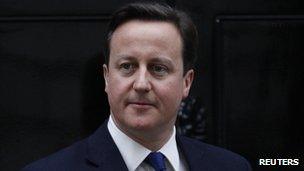Why the prime minister can't veto bank bonuses
- Published
- comments

Royal Bank of Scotland's remuneration committee and full board have not yet discussed in a formal sense whether the bank's chief executive Stephen Hester should receive a bonus for his performance in 2011 - as the bank perhaps peevishly pointed out today.
But - as I wrote yesterday - the bank's non-executive directors and its chairman, Sir Philip Hampton, are determined that he should receive one: probably around £1m, and rather more than that in respect of the so-called long-term incentive plan.
So will that put RBS on a collision course with the prime minister, who today made clear his distaste for any bumper payout to the chief executive of the largely nationalised bank?
Well, what David Cameron said was that Mr Hester's bonus must be smaller than last year's. And, as it happens, a £1m bonus is half what Mr Hester was paid for 2010.
The prime minister could go further and veto any bonus. But in those circumstances, he would cause something of a crisis at the bank, because the authority of its directors would have been undermined and they might well feel obliged to resign.
So even at a bank like RBS, which is 81% owned by taxpayers, there is a limit to how far the prime minister's writ can run.
And as for Barclays, Mr Cameron may well feel uncomfortable as and when that sprawling global institution discloses that several million pounds each have been paid to its top people - but the prime minister has very little sway at Barclays (or other banks where there's no state shareholding), even though Barclays (like all big banks) knows it would be bailed out by taxpayers in a crisis.
By the way, the share prices of both Barclays and RBS have bounced sharply today, and are up more than 9% and 8% respectively.
In fact, there's been a surge of bank shares across Europe - with Italy's biggest bank Unicredit 14% higher and Soc Gen of France rising 13%.
That seems, at least in part, to have been driven by new research from the investment bank, Morgan Stanley, which argues that the European Central Bank (ECB) is flooding the eurozone banking system with even more cheap loans than was widely thought (up to €1.3bn by February, MS says, with perhaps 900bn euros of this in the form of unprecedented three-year loans).
Perhaps more significantly, Morgan Stanley thinks that financial regulators and the ECB are together conspiring to give incentives to banks to use much of this cheap cash to buy government debt, especially Italian and French sovereign debt.
Or to put it another way, the ECB doesn't want to be the lender of last resort in a direct sense to a government struggling to borrow such as Italy (or at least not in any great size). But, as I've mentioned before, it is happy to lend to Italy when mediated by Italian banks - even when those banks aren't the strongest on the planet.
All of which represents slightly more substantial sticky plaster for the eurozone than many investors may have believed was being applied.
So a bit more time may have been bought for eurozone leaders to find a proper solution to the currency union's fundamental problem, which is that a number of eurozone economies are growing too slowly to comfortably service their huge and growing debts.